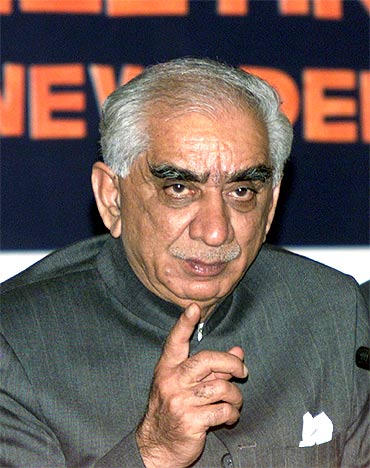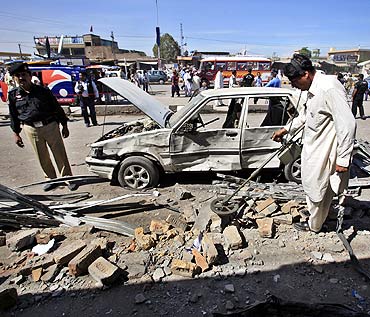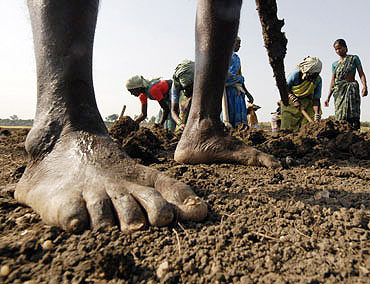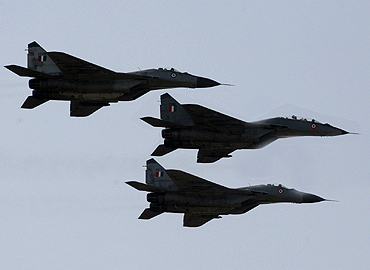
Bharatiya Janata Party leader Jaswant Singh tells Aditi Phadnis about his fears for India, various policies and stance taken by the government and the global environment.
What is your major concern these days?
There is a grave sense of uncertainty over the country's condition. The main challenge is to establish both the focus and authority of governance. This challenge has not only to do with individuals, but it is also institutional. We are faced with institutional deficiencies of challenging proportions. At a certain level, I see this not just as a critical observation of this or that government, but the entire political class that is missing the centre of gravity of the challenge.
India today faces a great disjunct between the practices of democracy, the percept of democracy and those that are asserting themselves as its preservers or practitioners. Somewhere, I'm sure the political class to which I belong and I don't separate myself from this deficiency has very gravely let India down. The system we are practising has stood still and is now covered by multiple layers of misunderstanding, prejudice and distortion. All of us who put our feet on it are apt to slip and fall, so thick is the moss. It is this corruption that is the central challenge.
A corruption of this gravity I am observing for the first time. This is my eighth term in Parliament and my 55th year in public service. I have participated in all general elections from the 4th to the 14th. And, for the first time, I see multiple challenges arising at the same time.
...

How do you define these challenges?
There is an internal security crisis, the economic challenge stares us in the face, there is an external challenge, a security crisis but the challenge that worries me the most is the aspirational challenge: The expectations of those who represent the democratic dividend.
Let us not delude ourselves into believing that dynastic descent will resolve this. In fact, discontent arises because of this.
Let's talk about the global environment and India...
Never in the last 60 years has there been such a situation in the neighbourhood, such great disorder. Sri Lanka, Nepal, Pakistan and Afghanistan are of course disturbed. But, the Levant and the Maghreb are not at peace either.

But where is India's voice? Who is speaking for India? And internally?
Look at the reality of India today internally. The whole of the southern peninsula has stopped listening to Delhi. In Andhra Pradesh, 80 elected representatives in the assembly have resigned as have several MPs. Tamil Nadu is on its own trajectory. No one is even asking what the Northeast is doing.
To top it all, the Red Corridor, with 200 plus districts, is troubled by Maoists. It is now more than a week since the Mumbai blasts happened. We are nowhere near working out who did it.
This is the dream government for economists. There are more economists in this government than there have been in any since independence. So I want to know why is there a fiscal crisis? And when you combine the fisc with the absence of authoritative decision making, and add gross supply-side mismanagement to that, you have a continual pressure on prices and food inflation. What is the central government doing about it?
It has committed such profound errors. Rs 85,000 crore has been sunk into NREGA.
Take food. Some agency called NAC (National Advisory Council), not answerable to anybody, has made some suggestions. Nobody is told anything, but the government feels obliged to accept its suggestions. What is going on? Has any scientific study been done to understand implications of NAC's suggestions on India's food security?
So what happens? The fisc goes out of control. Laws of economics begin to assert themselves and, combined with global pressure on commodity prices, uncertainty in the European and US front.
Did you know that for almost six months India has not paid Iran for oil supplied by that country because it can't decide how to pay? Iran continues to supply oil but has been pushed to the wall and is making discreet enquiries about when it will be paid. Where is the government's decision?
Iran calls a conference on terrorism and invites the Vice-President along with Asif Ali Zardari, Hamid Karzai. India doesn't even respond! A relationship with the United States means the abandonment of our interests in Afghanistan.
There is a fundamental disharmony between the immobility of the system, the impermeability of the government and the ossification of the political class.

What, in your opinion, should the response be?
France and the UK were led by a revolution in thought. The freedom movement was a revolution of thought. Quit India are just two words, but such a revolution of thought! What is the revolutionary thought in India today ? What is the thought that is leading ?
I am most worried about security. I read a news item recently that 19 retired lieutenant generals who congregated in a seminar recently all bemoaned corruption, the absence of sunwai (hearing), the gaps in equipment.
And all the prime minister says is that he's going to raise two divisions, overdue anyway.
China is far ahead of us, but we are caught in the trap of capability watching. What lead has the government given in this regard?
Almost 10 years have gone by since my friend Arun Singh and I said we needed at least 146 new fighter aircraft. We haven't decided yet which aircraft India is going to buy. Even after we decide, it will take at least another four years to induct. We must abandon trivia. We must recognise the substance of the challenge, otherwise we are in grave danger of being unbalanced, of being thrown off balance.